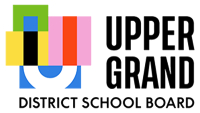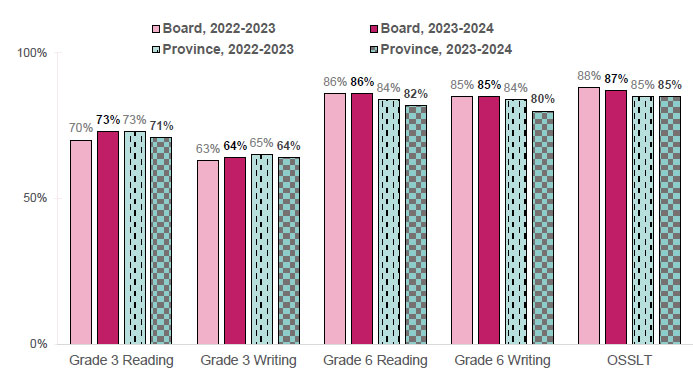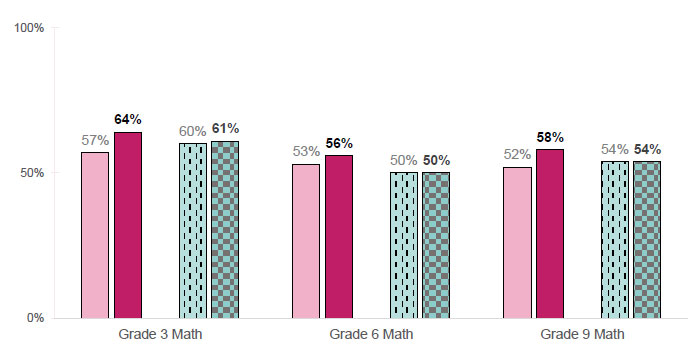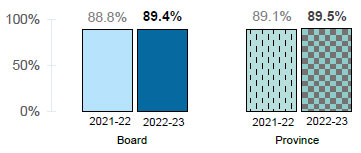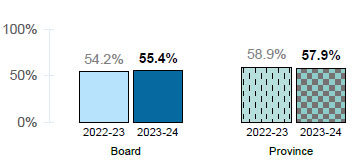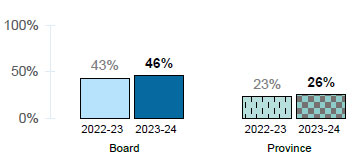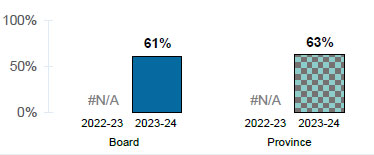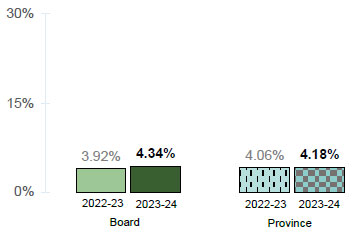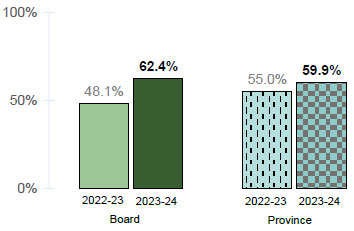Student Achievement Plan: Upper Grand DSB
2023-2024 Academic Year
Achievement of Learning Outcomes in Core Academic Skills
Goal: Improve student's literacy learning and achievement
Measure: % of student who met or exceeded the provincial standard on EQEAO Assessments for Grade 3/6 Reading and Writing and % of first time eligible students who were successful on the OSSLT/TPCL
Goal: Improve students' math learning and achievement
Measure: % of students who met or exceeded the provincial standard on EQAO Assessments for Grade 3/6/9 Math
2023-2024 Academic Year
Preparation of Students for Future Success
Goal: Improve student's graduation rates and preparedness for future success
Measure: % of students graduating with an OSSD within five years of starting Grade 9, Includes students who began Grade 9 in 2018-2019 and tracks their progress until 2022-2023.
Measure: % of students who earn 16 or more credits by the end of Grade 10
Measure: % of students enrolled in at least one Grade 12 math or Grade 11 or 12 science courses
Measure: % of students participating in at least one job skills program (Specialist High Skills Major, Dual Credits or Ontario Youth Apprenticeship Program)
Measure: % of students who believe their learning has prepared them for the next step in their learning experience (i.e. next grade, post secondary, etc)
2023-2024 Academic Year
Student Engagement & Well-Being
Goal: Improve student's participation in class time and learning
Measure: % of students in Grades 4-12 who were suspended at least once
Measure: % of students in Grades 1-8 whose individual attendance rate is equal to or greater than 90 percent
Goal: Improve student well-being
Measure: % of Grade 6, 9 and 10 students who report being aware of mental health supports and services in order to seek supports for mental health
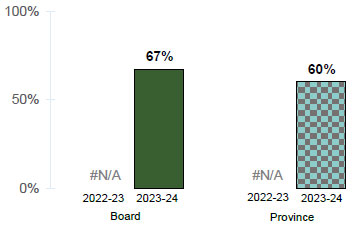
2023-2024 Academic Year
Achievement of Learning Outcomes in Core Academic Skills
Goal: Improve students' literacy learning and achievement
% of students who meet or exceed the provincial standard on:
School Board | Province | |
|---|---|---|
Grade 3 EQAO Reading | 73% | 71% |
Grade 3 EQAO Writing | 64% | 64% |
Grade 6 EQAO Reading | 86% | 82% |
Grade 6 EQAO Writing | 85% | 85% |
% of fully participating, first-time eligible students who are successful on the OSSLT/TPCL | 87% | 85% |
Goal: Improve students' math learning and achievement
% of students who meet or exceed the provincial standard on:
School Board | Province | |
|---|---|---|
Grade 3 EQAO Math | 64% | 61% |
Grade 6 EQAO Math | 56% | 50% |
Grade 9 EQAO Math | 58% | 54% |
2023-2024 Academic Year
Preparation of Students for Future Success
Goal: Improve students' graduation rates and preparedness for future success
School Board | Province | |
|---|---|---|
% of students who earn 16 or more credits by the end of Grade 10 | 81% | 78% |
% of students who participated in at least one job skills program (SHSM, Dual Credits or OYAP) | 46% | 26% |
% of students who graduated with an OSSD within five years of starting Grade 9 (2022-2023) | 89.4% | 89.5% |
% of students who enrolled in at least one Grade 12 math or Grade 11 or 12 science courses | 55.4% | 57.9% |
% of students who believe their learning has prepared them for the next step in their learning experience (i.e. next grade, post secondary, etc.) | 61% | 63% |
2023-2024 Academic Year
Student Engagement & Well-Being
Goal: Improve students' participation in class time and learning
School Board | Province | |
|---|---|---|
% of students in Grades 1-8 whose individual attendance rate is equal to or greater than 90 percent | 62.4% | 59.9% |
% of students in Grades 4-12 who were suspended at least once | 4.34% | 4.18% |
Goal: Improve student well-being
School Board | Province | |
|---|---|---|
% of Grade 6,9 and 10 students who report being aware of mental health supports and services in order to seek supports for mental health | 67% | 60% |
Actions School Board Will Take to Improve
Achievement in Learning Outcomes in Core Academic Skills
Introduction
At the Upper Grand District School Board (UGDSB), our commitment to student achievement is guided by the priorities outlined in our Multi-Year Plan: Foundational Education and Student Achievement, Ensuring Equity of Access and Outcomes, Leading through Sustainability, Inspiring a Lifelong Love of Learning, and Championing Health and Well-Being. As we work toward realizing the UGDSB Vision 2026—to be recognized as leaders in creating unparalleled, agile, and inclusive learning experiences for all—we continue to strengthen our academic programs through equity-driven, data-informed strategies that support every learner.
Literacy Achievement
To improve student achievement in literacy and enhance EQAO outcomes, UGDSB is implementing a multi-year strategy rooted in evidence and equity. Key actions include expanding early reading screening, delivering targeted fluency interventions in Grade 3, and deploying Early Reading Teachers, Reading Facilitators, and Special Education Resource Teachers (SERTs) for focused support. Instructional practices are continuously informed by data and supported through professional learning. In secondary schools, literacy supports such as Lexia and Empower are being introduced and scaled up. These efforts intentionally prioritize students from low-income backgrounds, multilingual learners, and students with special education needs to ensure improved outcomes for all.
Mathematics Achievement
The multi-year mathematics strategy focuses on the early identification of learning gaps, targeted intervention, and robust professional development. Key initiatives include the expansion of the Early Math Assessment (EMA) screener in Grades 1 and 3, hiring of Math Support Teachers for small-group instruction, and providing educators with comprehensive in-person and virtual professional learning. Additionally, Grade 9 Collaborative Inquiry teams and a pilot Tier 3 intervention for Grade 3 students are being implemented. School leaders use real-time data to inform individualized student achievement plans, with specific supports for multilingual learners, students with special education needs, and Indigenous students. These strategies are being monitored and refined through 2026 to ensure measurable improvement.
Support for Multilingual Learners (MLL)
This year, the UGDSB launched a refreshed Multi-Lingual Learners (MLL) program delivery model. The new approach embeds support directly within students' home schools rather than relying on itinerant services, while also enhancing the capacity of school-based staff to support English language development. Professional learning has been provided to administrators, educators, and support staff to raise awareness and strengthen instruction for MLL students and their families.
To guide a data-informed approach, all educators have been supported in the use of the STEP (Steps to English Proficiency) framework. This tool helps identify student proficiency levels and tailor instruction accordingly, with data captured and updated through a centralized platform. As part of this refresh, the UGDSB is also collaborating with Student Support Services to pilot a process that ensures multilingual learners with special education needs are appropriately identified and supported. This important work will continue into the coming year.
Through these strategic initiatives in literacy, mathematics, and multilingual learner support, the UGDSB continues to advance the priorities of our Multi-Year Plan. These actions reflect our unwavering commitment to equity, academic excellence, and inclusive education. As we move toward 2026, our work remains focused on creating dynamic, responsive, and innovative learning environments where all students can thrive and reach their full potential—fulfilling our vision of becoming recognized leaders in unparalleled, agile, and inclusive learning experiences.
Preparing Students for the Future
To ensure every learner is equipped for success beyond the classroom, the Upper Grand District School Board has taken a series of purposeful, equity-driven actions aligned with its Multi-Year Plan. These efforts are focused on increasing student engagement, expanding access to future-focused pathways, and closing opportunity gaps—particularly for students from underserved or underrepresented groups.
The UGDSB has expanded access to credit recovery programs, alternative education pathways, and re-engagement strategies to support on-time graduation. Early flagging systems have been enhanced to identify and support students at risk of falling behind, while flexible learning options—such as e-learning and modular “Build a Credit” courses—have helped students accumulate credits by Grade 10. Specialized programs including Specialist High Skills Major (SHSM), the Ontario Youth Apprenticeship Program (OYAP), and cooperative education have been broadened, with targeted outreach to increase participation among underrepresented populations.
To support smooth transitions and informed decision-making, UGDSB has strengthened its guidance and career counselling programs, including professional learning for counsellors and structured transition planning beginning in Grade 8. The board has also committed to addressing gaps in STEM participation by collecting disaggregated data and student voice to inform inclusive and equity-focused planning.
As part of its commitment to culturally responsive education, UGDSB is developing an Africentric Grade 12 English course—a curricular innovation that meets provincial standards while embedding Black voices, histories, and experiences. This course affirms student identity and deepens engagement in literacy learning. In addition, educators are engaging in ongoing professional learning in equity-focused instructional leadership and culturally responsive pedagogy grounded in human rights principles.
These initiatives reflect UGDSB’s unwavering commitment to preparing students for a changing world. They align with the priorities of our Multi-Year Plan: Foundational Education and Student Achievement, Ensuring Equity of Access and Outcomes, Leading through Sustainability, Inspiring a Lifelong Love of Learning, and Championing Health and Well-Being. Together, these priorities guide our journey toward Vision 2026—to be recognized as leaders in creating unparalleled, agile, and inclusive learning experiences for all.
Student Engagement and Well-Being
At the Upper Grand District School Board (UGDSB), we recognize that student success begins with well-being. In alignment with our Multi-Year Plan, we are taking deliberate steps to ensure that all students feel supported, connected, and empowered throughout their educational journey.
To improve mental health and well-being support, the UGDSB has developed a renewed, data-informed plan rooted in consultation with students, staff, and families. This plan emphasizes early intervention—offering timely, accessible support before challenges become more complex. While enhanced services remain in place for students facing significant mental health needs, our broader goal is to reach more students earlier, with the right supports at the right time.
At the heart of this work is a renewed focus on student voice and individualized care. Conversations about well-being are now more student-centered and responsive, with supports tailored to meet evolving needs. We have restructured the way supports are delivered, ensuring greater collaboration and coordination across student support services and school-based teams. Teachers and support staff meet regularly to co-develop strategies that directly address student needs, creating a seamless and integrated system of care.
Multidisciplinary teams now engage in regular consultations, using shared expertise to guide the development of student support plans. Our improved data tools and evidence-based decision-making processes ensure that supports are proactive and targeted. These enhancements are already showing early signs of improved student outcomes and more responsive service delivery across our schools.
In addition, UGDSB has fundamentally restructured its Student Support Services model to place more professionals directly in schools. This integrated approach fosters stronger partnerships between educational and support staff and helps ensure students receive consistent, in-school support. Data collection processes have also been upgraded to allow for timely, evidence-informed decisions that reflect the real-time needs of our students.
Central to these efforts is our unwavering commitment to equity and human rights. As we implement the 2024-2025 Student Achievement Plan, the development of a Human Rights Policy Framework is playing a key role in promoting student well-being and academic success—particularly for students from historically underserved communities. This framework will guide efforts to remove systemic barriers, ensure equitable access to high-quality instruction, and foster inclusive learning environments for all. Trauma-informed practices have also been embedded into our prevention and intervention strategies, ensuring a supportive and compassionate approach to student care.
The UGDSB recognizes that student success cannot be achieved without a firm commitment to equity and human rights. As we advance our 2024-25 Student Achievement Plan, the development of a comprehensive Human Rights Policy Framework is central to improving academic outcomes, future preparedness, and student well-being particularly for historically underserved communities. The Human Rights Policy Framework is being developed to support equitable access to high-quality instruction, with a particular focus on addressing systemic barriers that impact students disproportionately. Moreover, the board has implemented trauma-informed practices to ensure that student well-being is supported through both prevention and intervention strategies.
These initiatives reflect the UGDSB’s ongoing work to support students not only academically, but also socially and emotionally. Aligned with the Multi-Year Plan’s five core priorities—Foundational Education and Student Achievement, Ensuring Equity of Access and Outcomes, Leading through Sustainability, Inspiring a Lifelong Love of Learning, and Championing Health and Well-Being—this work supports our commitment to the UGDSB Vision 2026: to be recognized as leaders in creating unparalleled, agile, and inclusive learning experiences for all students.
Source: As reported by schools through the Ontario School Information System (OnSIS), 2021-2022 to 2022-2023, and the Education Quality and Accountability Office (EQAO), 2022-2023 to 2023-2024.
